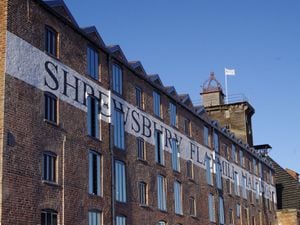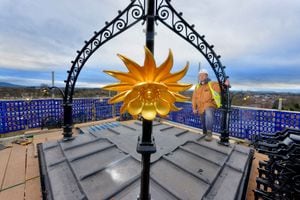Final stage of Shrewsbury's Flaxmill restoration under way
The final stage of Shrewsbury's Flaxmill restoration is under way, with £1 million of funding from Shropshire Council.

The final phase, which will last 18 months, will include repair work to the inside and outside of the main mill and kiln, before services can be put in across the site and infrastructure work completed.
Once that is complete, the final fitting-out of the inside of the building will be carried out, before the opening in Summer 2021.
The restoration has been designed to create a 'learning and enterprise' quarter in the Ditherington area of the town.
When complete the building will include offices for "the region’s growing creative industries and small business start-ups", as well as a visitor centre and a café.
Councillor Alan Mosley, chairman of the Friends of the Flaxmill Maltings, said it was wonderful that after 30 years of looking upon a derelict site, the community could look forward to the re-opening of one of Shrewsbury's landmark buildings.
He said: "It is fantastic to see the restoration of these historic buildings reach the final phase of construction.

"For 30 years, the community has become used to seeing the Main Mill and Kiln standing empty and in poor condition or shrouded in scaffolding but have been thrilled to see the progress in the last few years.
"It will be wonderful for local people to see these iconic buildings revealed and being fully restored, over the next 18 months, as we move towards their long-awaited opening in summer next year."
Councillor Steve Charmley, deputy leader and portfolio holder for assets, economic growth and regeneration for Shropshire Council, said the project would be a huge economic boost to the town and the county.
He said: "We’re delighted with the progress of work to transform the historic Flaxmill site into a centre for learning, leisure and business.
"Work has now reached the stage where, as we promised back in 2010, we will now contribute £1m to help the project proceed to completion, and we’re happy to do so.
"The development and regeneration of the site will provide a huge boost not just to this area of Shrewsbury, but to the town as a whole, and to the Shropshire economy, and I look forward to welcoming businesses and visitors to the site in the not too distant future.”
Construction work on the Grade I listed main mill and the Grade II listed kiln began in 2017 after a £20.7 million grant from The National Lottery Heritage Fund.
Extraordinary
Site owners, Historic England, and project partners, the Friends of the Flaxmill Maltings, also committed to contribute significantly towards the project, and a fundraising campaign run by Historic England has raised nearly £900,000 from charitable trusts, foundations, individuals and local companies, so far.
Duncan Wilson, chief executive at Historic England, said: “The Flaxmill is one of the most extraordinary historic places in the world. Not only has it played a central role in Shrewsbury for hundreds of years, but its pioneering design preceded the modern day skyscraper and has influenced architecture worldwide.
"This partnership with Shropshire Council and the Friends of the Flaxmill Maltings has been crucial in enabling this project to happen. It is a pleasure to see these unique buildings coming back to life as we enter the final stages of the restoration of the main mill.”
Dating back to 1797, the building operated as a flax mill until 1886 and then as a maltings from 1897 to 1987.
It was also a temporary barracks and training centre during the Second World War.
Its iron frame was truly pioneering, the work of British engineers who were determined to overcome the problem of timber-framed mills and factories being destroyed when fires broke out. The design gave birth to the modern skyscraper.





